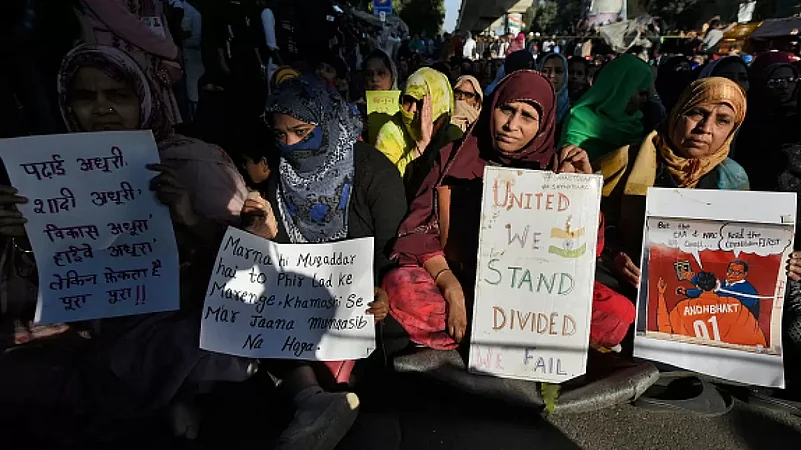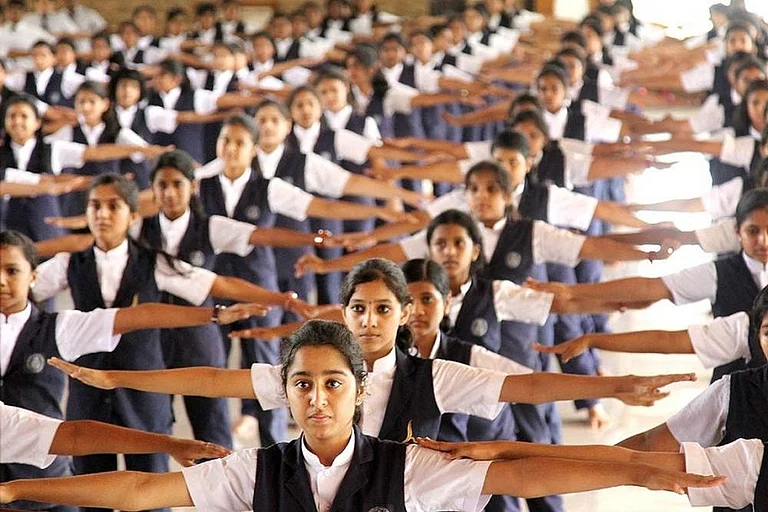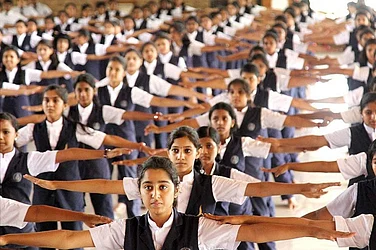It was December 2019. The usual chill of winter had set in in Delhi. Students rushed to their university campuses to make it to the 9am lecture. It was a scene performed with meticulous detail every day. But this was before the dystopia set in. Before the government passed the Citizenship Amendment Bill that fast-tracks the citizenship process only for non-Muslim migrants from three neighbouring countries, effectively singling out Muslims. And before the police wrecked vengeance on spaces that were meant to protect students.
Four years later, students who were attacked with rods, thrashed and beaten inside their college libraries, still face legal cases against them while Delhi police failed to apprehend the actual perpetrators behind those infamous masked faces. This observation was not just made by citizens, human rights activists, political leaders but also the Delhi High Court. “The police were unable to apprehend the actual perpetrators behind the commission of the offence but surely managed to rope the persons herein as scapegoats”.
And yet, several student activists still have cases pending against them – including Sharjeel Imam, Qasim Usmani, Ishrat Jahan, Khalid Saifi, Tahir Hussain, Saleem Malik, Mohd. Saleem Khan, Meeran Haider, Shadab Ahmed, Gulfisha Fatima, Tasleem Ahmed, Shifa Ur Rehman, Athar Khan, Umar Khalid, Safoora Zargar, Md. Faizan Khan, Asif Iqbal Tanha, Natasha Narwal and Devangana Kalita.
Pending cases, delay in legal process
Qasim Usmani, a student from Jamia Millia Islamia, recalls the beginning of the movement against CAB on December 10, 2019 – the same day as Human Rights Declaration Day. He, along with thousands of other students, planned a sit-in protest against CAB. Days later, on December 15, the agitation intensified.
Jamia students rose together and planned to march to the Indian parliament in protest. They were prepared with boxes of water bottles and pamphlets for fellow protestors arriving on their university campus. What was meant to be a peaceful protest turned into a battlefield with the fully armed police blocking unarmed students from marching to the parliament.
The police openly fired bullets and tear gas, recalls Usmani. “They even attacked students studying in the library,” he says. CCTV visuals from that day showed students pleading with the police to let them go, holding bags, books, and whatever they could find over their heads to avoid being hit on the skull. One policeman made sure to break the CCTV camera. “And all of this was blamed on the students themselves, resulting in FIRs against them,” Usmani says.
Usmani faces charges against him under IPC sections 147 (rioting), 148 (rioting, armed with deadly weapon), 149 (unlawful assembly), 186 (Obstructing public servant in discharge of public functions), 332 (causing hurt to a public servant in discharge of his duty), and 120B (criminal conspiracy) among others. These cases against him are still pending four years after protests first erupted against the CAA.
“We have been getting (court) date after date for the past 3 years,” says Usmani, but there has been no resolution. He goes to court regularly, sometimes skipping classes to fight legal cases.
Little relief was offered when a Delhi court on February 4 2023 discharged him, Sharjeel Imam, Safoora Zargar, Asif Iqbal Tanha, and seven others in connection with the violence which broke out near Jamia in December 2019. The court had then made crucial observations that the prosecution had filed “ill-conceived chargesheets” in which the police arbitrarily chose to array “some people from the protesting crowd as accused and others as police witnesses”.
However, in March, the Delhi High Court overturned the trial court’s order and charged them for rioting, unlawful assembly, among others.
What many students found absurd and unfair was that along with the Delhi police, the National Humans Rights Commission (NHRC) largely blamed the Jamia students for the December violence.
Chandan Kumar, a former student of Jamia, was hit on the head during the violence. And now, he has a case of culpable homicide against him. He was called for strenuous questioning by the Delhi Police Special Cell as per a notice issued to him under the stringent Unlawful Activities (Prevention) Act in May 2020.
Apart from being charged under sections for rioting, unlawful assembly, obstructing public servant in discharge of public functions, Chandan was also charged under Section 25/27 of the Arms Act.
“There are many accused in these cases, so far I don't know what my role is in these cases,” Chandan says. The arguments on these charges haven't even begun yet.
“It is physically difficult for me to attend these court hearings,” Chandan says. He is currently enrolled in University of Hyderabad. “I was short in attendance and was not able to appear for exams in the last two semesters,” he recalls. The mental and emotional exhaustion…he tries to elaborate, but fails.
The movement after
The fierce resistance on the streets against CAA was derailed due to the Covid-19 pandemic. But cases against student activists did not stop.
On April 16, 2020, Amir Mintoee, a student from Aligarh Muslim University in Uttar Pradesh, was providing food to the patients stuck at a local hospital because of the pandemic-induced lockdown, when the local police arrested him.
In the same month, Meeran Haider, who was a PhD student at Jamia, was arrested for allegedly conspiring to incite large-scale communal violence in Delhi. So was Safoora Zargar, who was more than three months pregnant at the time.
On 14 September 2020, Umar Khalid was arrested by a special cell of the Delhi Police for making “provocative statements” when then-US President Donald Trump was on a visit to India. He was accused as one of the “masterminds” in the Delhi riots violence that killed more than 50 people and injured hundreds more. Khalid and Haider continue to be in jail as of 2024.
These actions have left students and activists in a state of fear of being arrested. “So many innocent individuals were jailed and they continue to be in jail for four years. Many have stepped back from the movement due to this,” says Usmani.
Campus politics and activism has changed after the incident. The administration is frequently issuing show cause notices and suspensions to students who gather for protests. Students also observed that police presence outside campus has increased since then, which they say is traumatic considering the events of December 2019. And every December, these memories come to haunt again.
Now, months ahead of the Lok Sabha elections, the rules of the Citizenship Amendment Act 2019 (CAA) are expected to be notified soon. But student activists say that a movement like the one in 2019-20 will be difficult to mobilise now because they fear for their lives. “This is an attack on democratic nature of the country. Protest was never a crime. My crime was just that I participated in the protest,” Chandan reiterates.


























